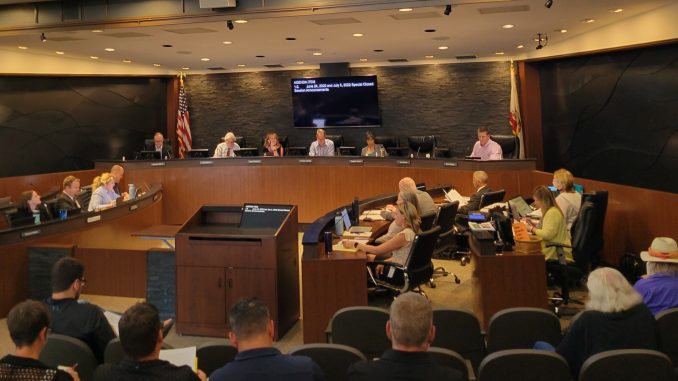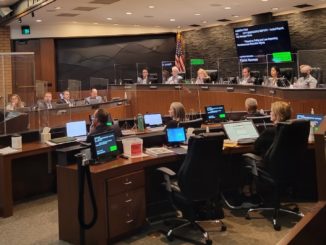
When the Chico City Council convened Tuesday evening (July 5) for closed session, an hour before open session, signs pointed to a meeting of unanimity. Literally so: City clerks had not affixed the seat marker for Alex Brown, the council’s progressive member—and Brown’s absence put all decisions in the hands of the conservatives.
The six acted in harmony on most things, most notably ratifying the contract of Mark Sorensen as city manager. Differences surfaced in two others.
The majority directed City Attorney Vince Ewing to redraft a “Quality of Life” initiative—a second pause that could push the proposal, put forward by Vice Mayor Kasey Reynolds, right up to the deadline for the November ballot. Several members voiced reservations after Ewing’s analysis raised significant legal concerns.
That vote still wound up 6-0, but Reynolds and Mayor Andrew Coolidge dissented from their colleagues in a commercial cannabis appeal. The 4-2 decision upheld a determination by city staff not to include CCB Enterprises among the final three applicants for the city’s three dispensary permits. The last step in the process is a public hearing in front of the city manager—Sorensen, inheriting this among myriad matters from Paul Hahn, who attended his last meeting as interim city manager Tuesday.
The hiring of Sorensen drew praise as well as criticism from public speakers. A few raised politics: A former Chico mayor in a conservative majority, Sorensen served as a councilman with Coolidge and Sean Morgan, his vice mayor and mayoral successor; his two terms (2010-18) also overlapped Dale Bennett’s tenure as a planning commissioner and Mike O’Brien’s as police chief. Speakers also brought up his compensation: $207,000 annual salary plus a $400 monthly vehicle allowance and benefits.
Morgan staunchly defended the hiring—though after the meeting, he told the CN&R that Sorensen didn’t need defending. He emerged from a pool of 21 applicants, narrowed by an outside recruiting firm to five, then ultimately by the council to two.
“I can’t tell you the names, but some of the names you’d recognize; a few were from just outside,” Morgan said. “Right now, with some of the cultural challenges the city has, we need someone who can do the work—there’s no question he can do the work—that knows the people, that knows our processes and can start making things a little better.”
Along with the Warren v. City of Chico settlement, the city will transition to a new police chief in September following Matt Madden’s retirement announcement and has interim department heads in administrative services and human resources.
“Nothing’s falling apart,” Morgan continued. “He’s just incredibly smart, and for all the people who think we went and found this guy who used to be on the conservative side, he worked with both sides to get things done. Always did. Always did. And a city manager who comes in with hard political views won’t make it long, anyway. So he’s going to be great for the city.”
Sorensen did not attend Tuesday’s meeting. The city administrator for Biggs, he had a special meeting of that city council at 3 p.m. He told the CN&R by phone he wasn’t certain when that business—a special meeting called to appoint a new city administrator there—would conclude and felt his presence in the Chico chambers would not be appropriate.
“I’m just honored to get the position and another opportunity to serve my little hometown again,” he said. “It’s a huge ball of tasks that you’ve got to take on; it’s daunting, very challenging, very demanding. I’m very, very familiar with it having been on council for eight years, particularly eight years of of some very challenging times.”
Those included a juncture Morgan pointed out to the public: post-Great Recession, when then-City Manager Brian Nakamura reorganized City Hall to address fiscal deficiencies. He and Sorensen aligned with members of the progressive majority at the time to support the changes.
“I think the council saw a lot of familiarity that someone from the outside would take I don’t even know how long to approximate,” Sorensen added. (Morgan estimated that period at a year to 18 months.)
Sorensen starts July 18.
“I look forward to him taking the reins and moving us forward,” Coolidge told the CN&R by phone. “He’s pragmatic, he’s intelligent, and he’s proven in running the city of Biggs, and particularly their utility, to be a good decision-maker. That was the basis for my decision.”
Initiative issue
Reynolds brought the “Protect Chico’s Quality of Life Act” to the council at the previous meeting, June 21. Over Brown’s dissenting vote, the conservatives instructed Ewing to analyze the draft and provide a ballot-ready measure Tuesday.
He fulfilled half that direction, submitting a report that posed conflicts with the Warren v. Chico settlement agreement, the U.S. Constitution, state laws, city ordinances and case law—in addition to deviations from the initiative upon which the proposal was based, an Emergency Shelter and Enforcement Act that was placed on the November ballot for Sacramento voters by their city council.
To “cut to the chase,” as Ewing did with council members in directing them to his summation page, he determined the proposal “is unconstitutional, unlawful, is in violation of the Warren settlement and the city of Chico Municipal Code, and therefore is not recommended to be adopted or placed on the ballot as drafted.”
He suggested no substitute language nor measure.
The city has only until 88 days before the November election—Aug. 12—to get an initiative on the ballot. The next council meeting is Aug. 2. Logistical necessities relegated the material matter to a seemingly secondary consideration.
For instance, Coolidge questioned a provision under which citizens would receive $5,000 from the city for every 30 days a reported nuisance goes unabated, calling that “a big way to bankrupt the city”
He made the remark after Reynolds’ motion for Ewing to craft a new version for public input ahead of the Aug. 2 meeting delineated a couple modifications (amplify the city’s vision statement, establish a commission to clarify the mandate). The mayor wondered how the city attorney would know what else to change.
“Take the $5,000 off,” Reynolds replied. Light laughter emanated from the dais and the audience, but she was serious; she explained “the most important thing” is ensuring a complaint process. She deflected Coolidge’s query about whether she wrote the initiative; afterward, she told the CN&R she worked on it with several other community members, referencing the Sacramento measure.
O’Brien noted the terms “unlawful” and “unconstitutional” in Ewing’s analysis got his attention. Reiterating his admonition from the previous meeting about any proposal needing to “pass legal muster,” he seconded Reynolds’ motion, which passed 6-0 after the city attorney said he had enough time and ample direction to move forward.
“It would be great if we had another meeting and we were able to have more time for more input and to open that up,” Reynolds told the CN&R. “I think we’ll still get there and we’ll still get it done. Hopefully we’ll be able to get that sooner. The public will be able to see it Thursday [July 28, ahead of the August meeting], it will be out for the Tuesday agenda, and then we’ll see what happens from there.”
Coolidge and Morgan expressed wait-and-see mindsets.
“I understand what people are trying to do,” Morgan said. “This council is pushing very hard for enforcement. We’ve spent a lot of money on shelters to take care of those in need. If there’s more things we can do, I’m alright with that … but I don’t want to cross any more lines, I don’t want any more lawsuits. I mean, things are starting to get good, things are starting to clean up, let’s keep going.”
Said Coolidge: “If the thing is that we want to give citizens a clear way to complain about issues that affect the quality of life, we have that: It’s code enforcement. … So I’m concerned about the additional step. Why not just a change in the city code affecting fines or the process [of enforcing violations]? And that may be the logical outcome of this in its entirety.”




Be the first to comment